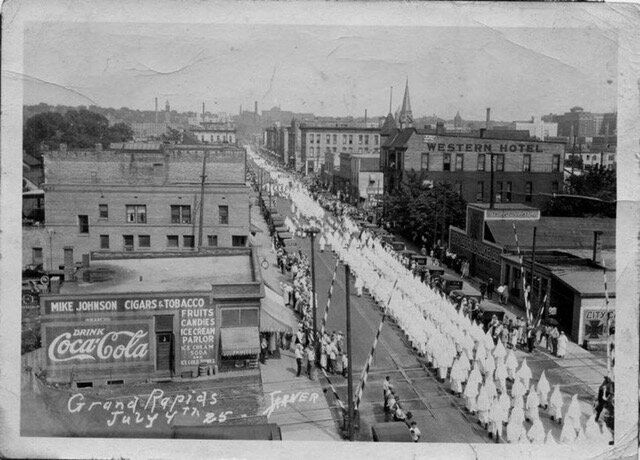Stop Saying That: All Lives Matter
/NOTE: “Stop Saying That” is a blog series written to make us think about phrases we say without giving them much thought. It is hoped that knowing the broader context behind these sayings will cause us to stop mindlessly repeating them.
Stop Saying That: All Lives Matter
Today, the expression we’re looking to take out of mindless circulation is All Lives Matter. This is a slogan used pretty exclusively by white folks who don’t understand the Black Lives Matter movement. So, let’s take a moment to look at context of American history to get a firmer grasp. If you are squeamish about harsh truths about the racist roots of the United States, it might be wise to stop reading now.
Let’s be clear. Despite the platitudes of our founding fathers, this country has never believed that non-white lives mattered. Not from the earliest days when colonizing Europeans killed Native Americans in order to take their land. Not in 1619 – 400 hundred years ago now – when they imported the first African slaves. Not for the following two and half centuries when kidnapping and enslaving black people was the law of the land.
This was not believed when the founding fathers wrote race privileges and exclusions into the Constitution. Not when African slaves were given 5/8 value of a person for purposes of southern states’ representation power in Congress, but less than the full value of a whole person.
For centuries, white Americans extolled the virtues of their own hard work, while ignoring the fact that its prolific economy was built on the backs of free labor – by peoples they considered genetically inferior. The very White House – a rather ironic name, which has housed all American presidents, was built by black slave labor.
When slavery ended in 1865, people of color were not suddenly “equal” across the country. Post-Civil War laws were enacted to suppress non-whites in multiple ways, including sundown statutes, anti-miscegenation laws, and segregation in housing and other living and work accommodations.
And then there were the extra-judicial, outside the law, ways of suppressing non-whites. Following the Civil War, the KKK and other white supremacy groups formed to terrorize communities of color. From the 1800s until well into the 1900s, they conducted night-time raids and daytime marches. In my city of Grand Rapids, thousands of hooded klansmen marched in open daylight down the main streets in 1925, less than one hundred years ago.
Then, there were the lynchings. Between 1880 and 1960, over 4,700 people were hung in rural obscurity and public squares. White townspeople gathered by the hundreds, or sometimes thousands, to gawk in festival-like atmosphere. White sheriffs, judges, and prosecutors frequently turned a blind eye.
In the 1800s, the majority-white U.S. Congress implemented the Chinese Exclusion Act, barring further immigration of Asians. Although Chinese workers had been brought in to help build the transcontinental railroad, when the work was finished, the presence of non-white Asians was seen as detrimental to the “white purity” of the nation, and racial discrimination was legalized. Anti-Asian discrimination reared its head prominently in the 1940s when hundreds of thousands of Japanese American citizens were rounded up and sent off to wartime concentration camps.
To suppress voting, states introduced poll taxes which poor black voters could not afford to pay. Others were intimidated from entering polling places. Others were made to pass a literacy test in order to cast a vote. These “legalized” forms of voter suppression abated after the 1968 Voting Rights Act, but various means of quashing voter access continue today…through ID requirements and limiting the access of polling places in certain neighborhoods. Illegal forms of voter discrimination continue as well.
All of the above is a multi-century backdrop of the degrading treatment of non-whites in the United States. The Black Lives Matter movement began in 2013 on social media after the acquittal of vigiliante George Zimmerman who had shot and killed African-American teenager Trayvon Martin the year before. BLM street demonstrations followed in 2014 with the killing of two African American males, Michael Brown in St. Louis and Eric Garner in New York City, both at the hands of white police.
What is clear to people who follow the numbers is that people of color are more frequently followed and stopped by white police, are more frequently frisked and arrested by police. They are shot and killed by police at 2.5 times the rate of whites. At FLYB, we acknowledge that policing is dangerous work, but if black and brown citizens commit crimes at roughly the same rates as white people, why are fewer white people tried, convicted, imprisoned, and executed in the U.S. criminal justice system than black folks? The answer lies in a continuation of centuries of viewing people of color as less human and less worthy of equal treatment.
Why do we say that Black Lives Matter? Because this country has demonstrated that it believes that white lives are more important. Why won’t we say that white lives matter? Because the value of white lives has never been in dispute. In future conversations, we hope you will stay attuned to both what people say and what they mean. When all lives truly matter equally, then we can drop all the slogans.





